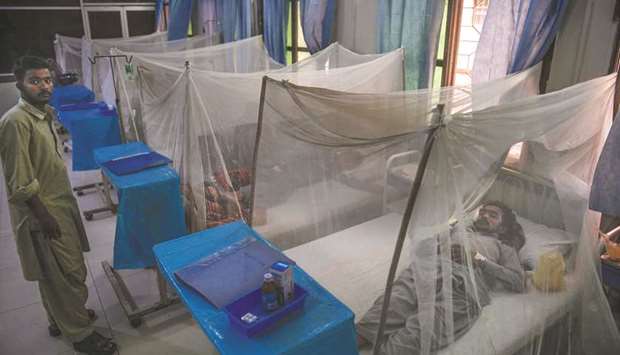The number of dengue patients across Pakistan crossed 50,000 yesterday as health officials struggled to cope with the deadly epidemic on a mass scale.
According to a news report by Urdu newspaper Jang, at least 250 people have already died of dengue in different parts of the country over the past few weeks.
The twin cities of Rawalpindi and Islamabad are the worst-hit areas.
Health officials estimate that at least 25,000 people in the twin cities have tested positive for the dengue virus recently.
In the two big hospitals of Islamabad alone, some 8,000 dengue cases have been identified.
Health departments has confirmed at least 35 deaths from the dengue virus in Rawalpindi and Islamabad.
On Friday, another death was reported from the Morgah area of the Rawalpindi city.
Reports suggest that at least 750 dengue patients are currently undergoing treatment at different hospitals in the twin cities, where the health staff taking care of them numbers only 35.
At least 150 law enforcement officials have also fallen victim to the dengue virus.
Authorities are not revealing the correct figures out of fear of a backlash by the general public.
Last week, two people died of dengue in Karachi, taking the death toll of people dying from the deadly disease to 14 in the metropolis.
Meanwhile, thousands more people reportedly tested positive for dengue in Punjab.
Dubbed “breakbone fever”, dengue is one of the world’s leading mosquito-borne illnesses and infects tens of millions across the globe annually.
Around half of the planet’s population live in at-risk areas, mainly in Latin America, Africa and Asia.
Outbreaks have ravaged Southeast Asia this year, infecting hundreds of thousands and killing hundreds.
The outbreak appears to have broken the previous record in 2011, when 27,000 people were affected by the mosquito-borne disease, although the death toll then was higher, with 370 having lost their lives.
Dr Rana Safdar, chief of Disease Surveillance Division at the National Institute of Health (NIH), said that the huge number of cases reported this year shows that surveillance and awareness have improved, and that more patients get themselves tested for dengue compared with the past.
However, he advised people “not to get panicked as over 90% of patients don’t even need treatment and that most of dengue victims died due to dehydration”.
Earlier this year “the World Health Organisation included dengue among top 10 global public health threats to the world”, Safdar said.
So far this year, the Philippines reported 292,076 cases and 1,084 deaths, while Vietnam has reported 124,751 cases, Malaysia reported 98,184 cases, Thailand reported 85,520 cases, Bangladesh saw 81,839 cases, Sri Lanka 46,126 cases, Laos 30,662 cases, Singapore 12,371 cases, Bhutan 7,664 cases, Nepal 5,096 cases, and Maldives 3,706 cases.
“Like many other countries in the region, Pakistan is also facing dengue upsurge in 2019,” he said.
He said that dengue mosquito can’t fly more than 100m during its lifetime, which is around 20 days.
It is born in houses and lays eggs there or at nearby places.
“Community awareness can create major hurdle against dengue and can decrease the number of cases. People should use mosquito repellent, cover their arms and legs, particularly before sunrise and after sunset.
“In case they have dengue, they should not panic as it can be treated with consumption of lots of fluids and fruits, and controlling the fever,” said Safdar.
This year the government has established a national centre to tackle dengue on the pattern of the national centre dealing with polio, he said, hoping that from next year better results would be observed.
Safdar said that the NIH Emergency Operation Centre has been activated to monitor the dengue situation and a daily situation report is being sent to the federal and provincial health departments.
The seasonal awareness and alert letter and the advisory on prevention and control have been widely disseminated.
A task force led by Special Assistant to the Prime Minister on Health Dr Zafar Mirza is leading response activities and reviews the situation on a daily basis to execute the requisite measures.
Dedicated beds have been allocated to tackle dengue both in public and private hospitals of Islamabad and the quality of clinical services is being vigorously monitored.
“The observed case fatality rate, therefore, stays below 0.2% i.e. well within the limits of 1% targeted by the WHO,” he said.
The NIH is providing technical assistance and laboratory support to the provinces for ascertaining the circulating serotypes in different geographical zones, Safdar said.

Patients suffering from dengue fever rest on beds under nets at a government hospital in Karachi.
